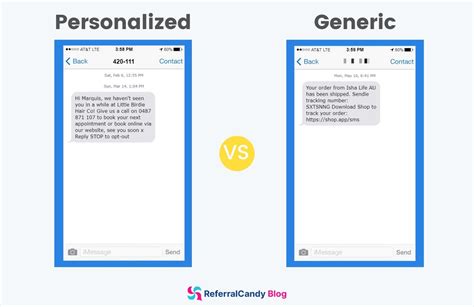In today's digital age, businesses are constantly seeking innovative ways to connect with their customers and stay ahead of the competition. One effective strategy that has gained significant attention in recent years is personalized text message marketing. By leveraging the power of SMS, businesses can build stronger relationships with their customers, increase engagement, and drive sales.
The rise of mobile devices has transformed the way people communicate, with text messaging becoming an essential part of daily life. According to a report by Pew Research Center, 96% of Americans own a cellphone, and 81% of them use their phones to send or receive text messages. This presents a massive opportunity for businesses to reach their target audience through a medium that is both personal and convenient.
Personalized text message marketing, in particular, has shown remarkable promise in delivering impressive results. By tailoring messages to individual customers based on their preferences, behaviors, and interests, businesses can create a more intimate and engaging experience. This approach not only boosts customer satisfaction but also fosters loyalty and encourages repeat business.
Benefits of Personalized Text Message Marketing
So, what makes personalized text message marketing so effective? Here are some key benefits that businesses can expect from this approach:
1. Increased Open Rates
Text messages have a significantly higher open rate compared to emails. In fact, a study by Gartner found that text messages have an open rate of 98%, compared to 22% for emails. By personalizing text messages, businesses can increase the likelihood of their messages being read and acted upon.
2. Improved Customer Engagement
Personalized text messages can help businesses build stronger relationships with their customers. By addressing customers by name, referencing their previous interactions, or offering personalized recommendations, businesses can create a sense of familiarity and trust.
3. Enhanced Customer Experience
Personalized text message marketing allows businesses to provide customers with relevant and timely information. This can include exclusive offers, early access to new products, or personalized promotions, all of which can enhance the overall customer experience.
4. Increased Conversions
By tailoring messages to individual customers, businesses can increase the likelihood of conversion. Personalized text messages can include specific calls-to-action, such as "Redeem your offer now" or "Shop our latest collection," which can drive sales and revenue.
5. Better Customer Insights
Personalized text message marketing provides businesses with valuable insights into customer behavior and preferences. By analyzing response rates, click-through rates, and conversion rates, businesses can refine their marketing strategies and improve their overall customer experience.

How to Implement Personalized Text Message Marketing
Implementing personalized text message marketing requires a strategic approach. Here are some steps businesses can follow:
1. Build a Customer Database
The first step in implementing personalized text message marketing is to build a customer database. This should include customer contact information, preferences, and behaviors.
2. Segment Your Audience
Once you have a customer database, segment your audience based on demographics, preferences, and behaviors. This will help you create targeted and personalized messages.
3. Create Personalized Messages
Use customer data to create personalized messages that address customers by name, reference their previous interactions, or offer personalized recommendations.
4. Use Trigger-Based Messaging
Use trigger-based messaging to send personalized messages based on specific events, such as birthdays, anniversaries, or purchase milestones.
5. Monitor and Analyze Results
Monitor and analyze the results of your personalized text message marketing campaigns to refine your strategies and improve your overall customer experience.
Best Practices for Personalized Text Message Marketing
To get the most out of personalized text message marketing, businesses should follow these best practices:
1. Keep Messages Concise
Keep messages concise and to the point. Avoid using jargon or overly technical language.
2. Use Personalization Tokens
Use personalization tokens, such as customer names and preferences, to create personalized messages.
3. Avoid Spamming
Avoid spamming customers with too many messages. This can lead to opt-outs and a negative customer experience.
4. Provide Value
Provide value to customers through exclusive offers, early access to new products, or personalized promotions.
5. Comply with Regulations
Comply with regulations, such as TCPA and GDPR, to ensure that you are sending personalized text messages in a responsible and compliant manner.






Conclusion
Personalized text message marketing is a powerful tool for businesses looking to build stronger relationships with their customers, increase engagement, and drive sales. By leveraging the power of SMS, businesses can create a more intimate and engaging experience that sets them apart from the competition. By following the best practices outlined in this article, businesses can get the most out of personalized text message marketing and achieve remarkable results.
We'd love to hear from you! What are your thoughts on personalized text message marketing? Share your experiences and insights in the comments below.
What is personalized text message marketing?
+Personalized text message marketing is a form of marketing that involves sending tailored messages to individual customers based on their preferences, behaviors, and interests.
What are the benefits of personalized text message marketing?
+The benefits of personalized text message marketing include increased open rates, improved customer engagement, enhanced customer experience, increased conversions, and better customer insights.
How do I implement personalized text message marketing?
+To implement personalized text message marketing, you need to build a customer database, segment your audience, create personalized messages, use trigger-based messaging, and monitor and analyze results.
